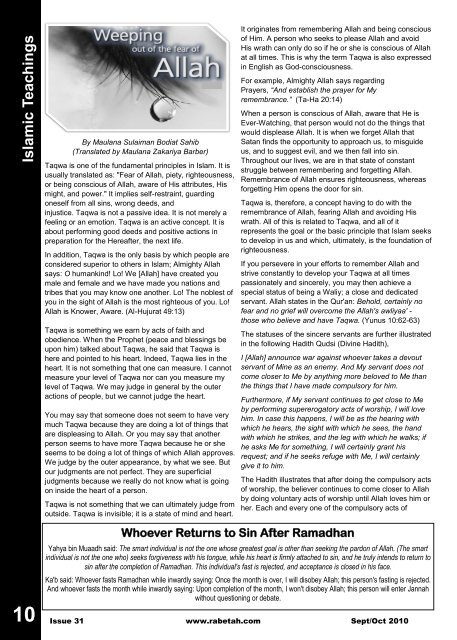Ramadhan - Rabetah
Ramadhan - Rabetah
Ramadhan - Rabetah
You also want an ePaper? Increase the reach of your titles
YUMPU automatically turns print PDFs into web optimized ePapers that Google loves.
Islamic Teachings<br />
It originates from remembering Allah and being conscious<br />
of Him. A person who seeks to please Allah and avoid<br />
His wrath can only do so if he or she is conscious of Allah<br />
at all times. This is why the term Taqwa is also expressed<br />
in English as God-consciousness.<br />
By Maulana Sulaiman Bodiat Sahib<br />
(Translated by Maulana Zakariya Barber)<br />
Taqwa is one of the fundamental principles in Islam. It is<br />
usually translated as: "Fear of Allah, piety, righteousness,<br />
or being conscious of Allah, aware of His attributes, His<br />
might, and power." It implies self-restraint, guarding<br />
oneself from all sins, wrong deeds, and<br />
injustice. Taqwa is not a passive idea. It is not merely a<br />
feeling or an emotion. Taqwa is an active concept. It is<br />
about performing good deeds and positive actions in<br />
preparation for the Hereafter, the next life.<br />
In addition, Taqwa is the only basis by which people are<br />
considered superior to others in Islam; Almighty Allah<br />
says: O humankind! Lo! We [Allah] have created you<br />
male and female and we have made you nations and<br />
tribes that you may know one another. Lo! The noblest of<br />
you in the sight of Allah is the most righteous of you. Lo!<br />
Allah is Knower, Aware. (Al-Hujurat 49:13)<br />
Taqwa is something we earn by acts of faith and<br />
obedience. When the Prophet (peace and blessings be<br />
upon him) talked about Taqwa, he said that Taqwa is<br />
here and pointed to his heart. Indeed, Taqwa lies in the<br />
heart. It is not something that one can measure. I cannot<br />
measure your level of Taqwa nor can you measure my<br />
level of Taqwa. We may judge in general by the outer<br />
actions of people, but we cannot judge the heart.<br />
You may say that someone does not seem to have very<br />
much Taqwa because they are doing a lot of things that<br />
are displeasing to Allah. Or you may say that another<br />
person seems to have more Taqwa because he or she<br />
seems to be doing a lot of things of which Allah approves.<br />
We judge by the outer appearance, by what we see. But<br />
our judgments are not perfect. They are superficial<br />
judgments because we really do not know what is going<br />
on inside the heart of a person.<br />
Taqwa is not something that we can ultimately judge from<br />
outside. Taqwa is invisible; it is a state of mind and heart.<br />
For example, Almighty Allah says regarding<br />
Prayers, “And establish the prayer for My<br />
remembrance.” (Ta-Ha 20:14)<br />
When a person is conscious of Allah, aware that He is<br />
Ever-Watching, that person would not do the things that<br />
would displease Allah. It is when we forget Allah that<br />
Satan finds the opportunity to approach us, to misguide<br />
us, and to suggest evil, and we then fall into sin.<br />
Throughout our lives, we are in that state of constant<br />
struggle between remembering and forgetting Allah.<br />
Remembrance of Allah ensures righteousness, whereas<br />
forgetting Him opens the door for sin.<br />
Taqwa is, therefore, a concept having to do with the<br />
remembrance of Allah, fearing Allah and avoiding His<br />
wrath. All of this is related to Taqwa, and all of it<br />
represents the goal or the basic principle that Islam seeks<br />
to develop in us and which, ultimately, is the foundation of<br />
righteousness.<br />
If you persevere in your efforts to remember Allah and<br />
strive constantly to develop your Taqwa at all times<br />
passionately and sincerely, you may then achieve a<br />
special status of being a Waliy; a close and dedicated<br />
servant. Allah states in the Qur'an: Behold, certainly no<br />
fear and no grief will overcome the Allah's awliyaa' -<br />
those who believe and have Taqwa. (Yunus 10:62-63)<br />
The statuses of the sincere servants are further illustrated<br />
in the following Hadith Qudsi (Divine Hadith),<br />
I [Allah] announce war against whoever takes a devout<br />
servant of Mine as an enemy. And My servant does not<br />
come closer to Me by anything more beloved to Me than<br />
the things that I have made compulsory for him.<br />
Furthermore, if My servant continues to get close to Me<br />
by performing supererogatory acts of worship, I will love<br />
him. In case this happens, I will be as the hearing with<br />
which he hears, the sight with which he sees, the hand<br />
with which he strikes, and the leg with which he walks; if<br />
he asks Me for something, I will certainly grant his<br />
request; and if he seeks refuge with Me, I will certainly<br />
give it to him.<br />
The Hadith illustrates that after doing the compulsory acts<br />
of worship, the believer continues to come closer to Allah<br />
by doing voluntary acts of worship until Allah loves him or<br />
her. Each and every one of the compulsory acts of<br />
10<br />
Whoever Returns to Sin After <strong>Ramadhan</strong><br />
Yahya bin Muaadh said: The smart individual is not the one whose greatest goal is other than seeking the pardon of Allah. (The smart<br />
individual is not the one who) seeks forgiveness with his tongue, while his heart is firmly attached to sin, and he truly intends to return to<br />
sin after the completion of <strong>Ramadhan</strong>. This individual's fast is rejected, and acceptance is closed in his face.<br />
Ka'b said: Whoever fasts <strong>Ramadhan</strong> while inwardly saying: Once the month is over, I will disobey Allah; this person's fasting is rejected.<br />
And whoever fasts the month while inwardly saying: Upon completion of the month, I won't disobey Allah; this person will enter Jannah<br />
without questioning or debate.<br />
Issue 31 www.rabetah.com Sept/Oct 2010
















